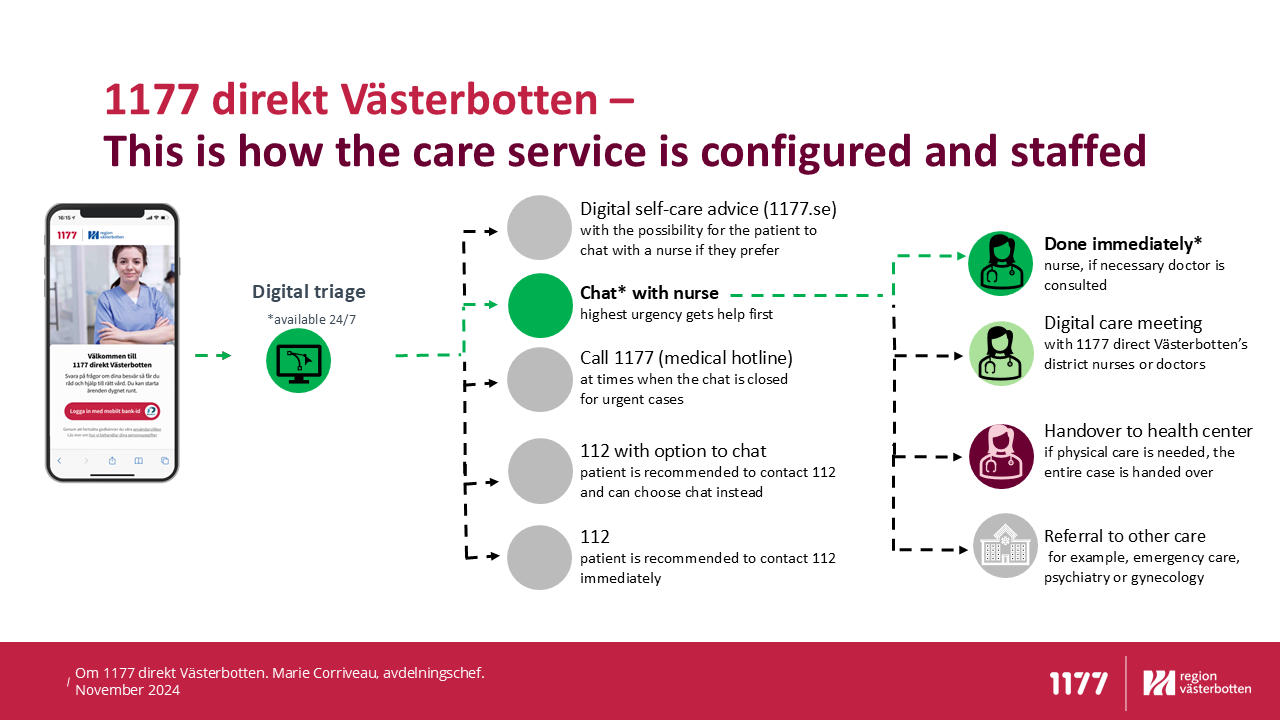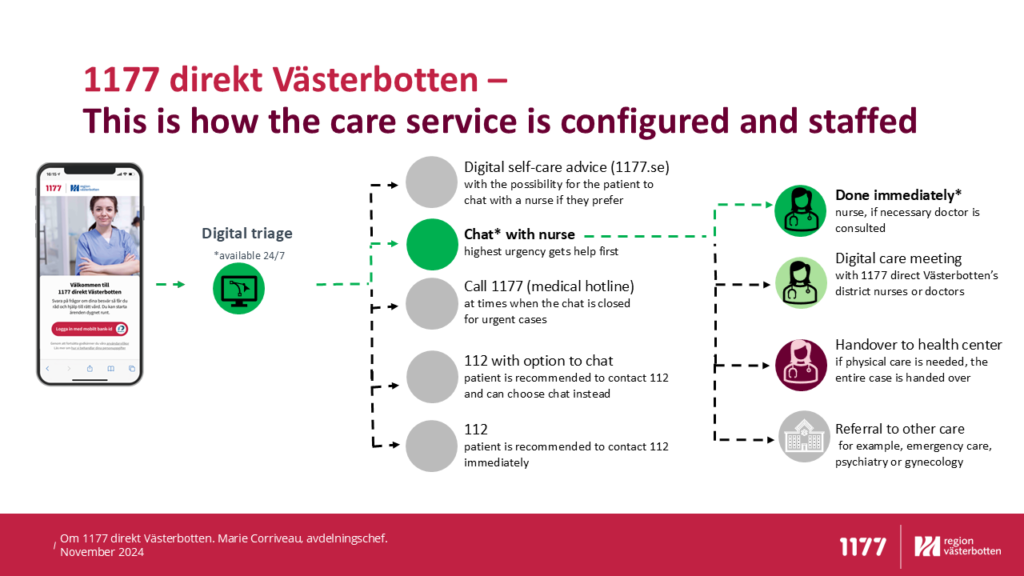Digital healthcare services that make a difference: 1177 direkt in Region Västerbotten, Sweden
"Patients feel that we hold their hand throughout the entire process; we never say we can’t help or that they have to seek help elsewhere." Marie Corriveau, Head of 1177 direkt in Region Västerbotten in Sweden, explains how the region's digital healthcare service has grown and evolved to manage and resolve more cases digitally while offering comprehensive care that fosters patient trust.

From Hälsodigitalen to 1177 direkt
Region Västerbotten’s digital healthcare service started during the pandemic under the name Hälsodigitalen (“The health digital”). Marie joined as a nurse and later became section leader and head of the service, now called 1177 direkt. Usage has steadily increased, with approximately 3,000 cases handled each month. By refining methods and routines, they aim to increase patient contacts by 20% in 2024 without expanding their team.
One central entry point to the right care
To ensure patients can easily access the service, multiple entry points are available via the patient’s healthcare center, a keypad option when calling 1177, or through the 1177.se website.
When patients contact 1177 direkt, they first fill out a questionnaire about their symptoms. The digital triage process leads to one of five outcomes (see illustration).

Nurses can invite doctors or other specialists to help resolve cases. If a case cannot be managed by 1177 direkt, it is referred to the patient’s healthcare center for further action, such as scheduling an in-person appointment. “We guide patients every step of the way so that no one feels forgotten or unsure about what happens next,” says Marie.
Patients appreciate receiving comprehensive assistance through the service, which has an average satisfaction score of 4.3 out of 5. Marie notes that those who discover the service often return, downloading the app and adding their children to make future access easier.
Two-Thirds of cases resolved digitally – with high satisfaction
1177 direkt in Västerbotten currently resolves 65-70% of cases entirely digitally, without referring patients elsewhere. Marie attributes this success to experienced doctors and a culture that encourages collaboration, including discussions about which cases can be handled digitally.
“Our doctors are incredibly skilled and courageous pioneers in digital healthcare. They fully utilize the tools to push the boundaries of how care can be delivered—they analyze images, consult specialists digitally, and use chat, phone, or video calls to examine patients.”
Nurses can quickly consult doctors via chat or video, eliminating patient wait times. The collaborative team environment encourages open questions, fostering continuous learning and improvements. The high volume of cases has also helped the team develop expertise in managing digital workflows efficiently. This setup has created a supportive work environment where colleagues naturally assist each other in challenging situations.
Diverse expertise available digitally
A key factor in resolving many cases is having a variety of expertise available digitally. For example, one general practitioner is also a cardiologist who can review past ECG results and assess current symptoms.
“It’s amazing to be able to tell a patient, ‘We have a cardiologist on duty who will review your case.’ It feels great to provide this level of service and reassurance,” says Marie.
This approach spares nurses from telling patients to call their healthcare center at 8 a.m. the next day, Lu knowing it’s likely they won’t get through.
A global work environment with close team bonds
1177 direkt’s staff work entirely digitally, spread across Sweden, Australia, and Spain. Despite the distances, the team has developed strong bonds, partly thanks to an active chat where they share experiences and support each other on both work and personal matters.
Marie highlights how the digital platform facilitates communication between professionals, making it easier to contact colleagues and receive quick responses compared to healthcare centers, where staff are often tied up in their own offices.
“Those who’ve worked at healthcare centers say they feel much closer to doctors now that they work digitally. It’s much easier to reach out,” she says.
A courageous culture that delivers results
Culture is a key success factor for 1177 direkt Västerbotten. The team frequently discusses how to improve workflows and encourages exploring new approaches. Marie emphasizes the importance of a courageous and open work culture where admitting the need for help and learning from mistakes is normalized.
“There are no stupid questions. Even though I’ve worked as a district nurse for many years, I’m not afraid to say I don’t know or understand.”
Continuity and reassurance for patients
The balance between continuity and accessibility in healthcare is often seen as a challenge, but Marie and her colleagues offer a different perspective.
“Our doctors always try to follow up with their own patients, but that’s not always possible. In most cases, though, it’s more important for patients to access care quickly than to always see the same doctor,” says Marie. “If I’m not working over the weekend, I know someone else will follow up with my patient. The key is ensuring the patient feels supported and secure.”
Tools like asynchronous chat channels allow patients and healthcare professionals to communicate over time without needing to be available simultaneously. Marie sees this as a significant improvement compared to the traditional “call back in three months” approach.
Collaboration with Healthcare Centers
Initially, healthcare centers were skeptical, feeling burdened by multiple systems. However, they soon realized that 1177 direkt could handle many of their patients’ needs and provide well-prepared handovers when necessary.
Collaboration has since improved, with healthcare centers appreciating the extra time freed up for other tasks as 1177 direkt manages a portion of their workload.
“We hold regular meetings with healthcare centers and continually find new ways to collaborate,” says Marie. For instance, the acne clinic achieves high treatment completion rates, benefiting both patients and healthcare centers.
Marie believes digital tools could benefit more areas of healthcare. “Take hypertension patients starting treatment—imagine if they immediately had an open channel with their healthcare center and care team through asynchronous chat. That would provide a great sense of security for patients!”